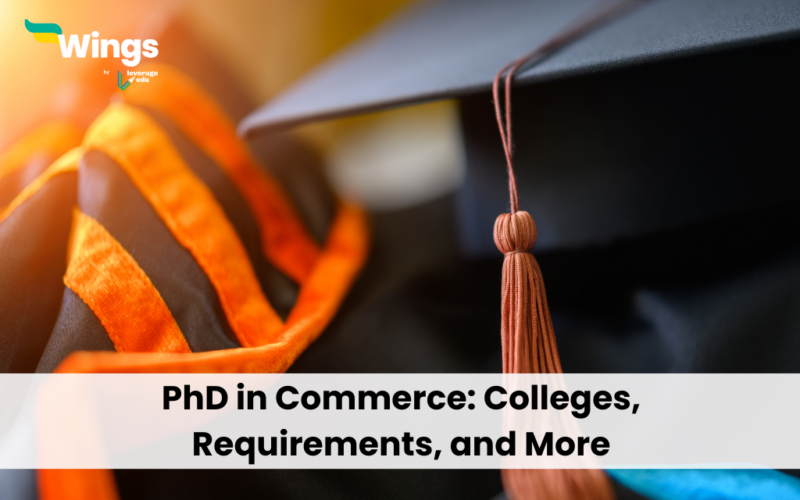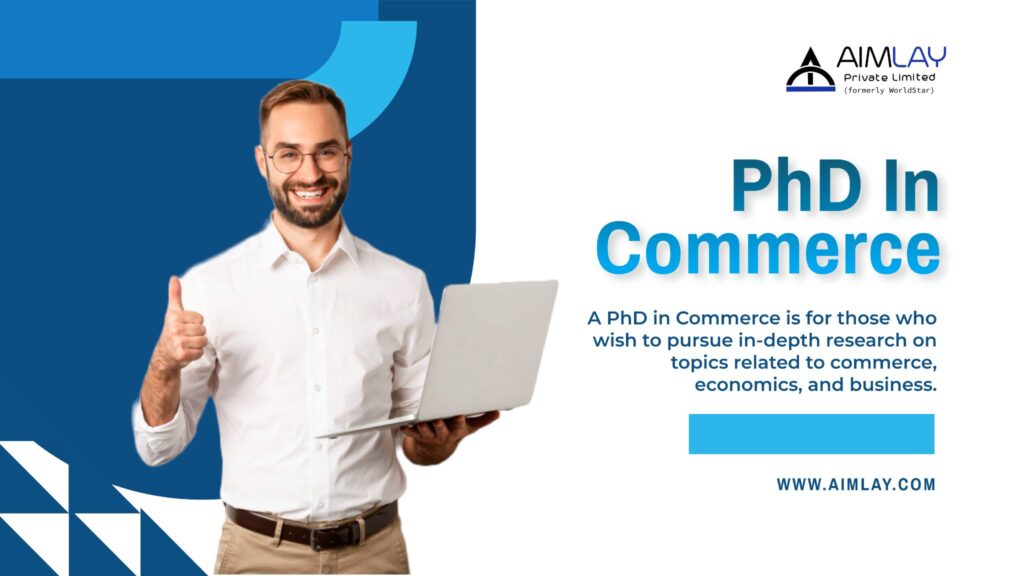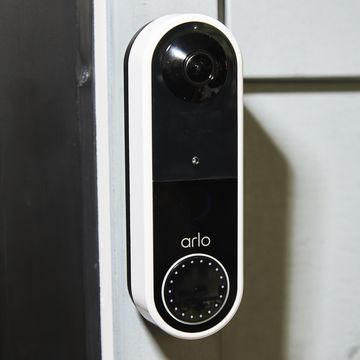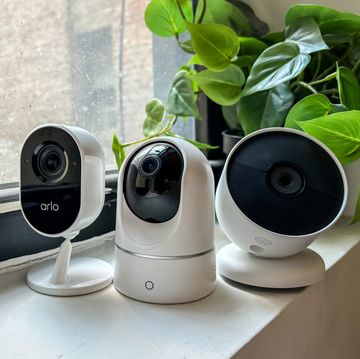

30,000+ students realised their study abroad dream with us. Take the first step today
Here’s your new year gift, one app for all your, study abroad needs, start your journey, track your progress, grow with the community and so much more.

Verification Code
An OTP has been sent to your registered mobile no. Please verify

Thanks for your comment !
Our team will review it before it's shown to our readers.

PhD in Commerce: Requirements, Salary, and More
- Updated on
- Jan 20, 2024

Diving into the intricate technicalities of the fields of Commerce and Business, Management and Finance, Actuarial Science and Taxation, and everything in between, a PhD in Commerce is one of the highest academic qualifications. The duration of a PhD in Commerce is 3 years and the basic eligibility is a master’s degree in a closely related discipline and some university might also ask for scores of certain entrance exams like UGC-NET. The major universities and colleges for PhD in Commerce in India include the University of Delhi, IGNOU, Jamia Milia Islamia, etc. while you can explore top universities abroad as well. Read this blog to know all about a doctorate in Commerce, its eligibility, specialisations and topics, subjects, top universities, salary, jobs and more.
This Blog Includes:
About phd in commerce, phd in commerce specializations, phd in commerce colleges in india, phd in commerce abroad, phd in commerce career and salary.
Counted amongst the popular courses for commerce students , as a candidate for PhD in Commerce, you can choose a subfield including, but not limited to Accounting, Marketing, Taxation, Human Resources, Strategy, IT Management, Consulting, and Finance. Furthermore, since these commerce subjects are quite vast in themselves, you are required to pick a deep-lying and relevant topic of research that accentuates their strong points. While the duration of a PhD varies according to the country of an institution, most have an average length of 3-8 years . Important components in this respect include:
- Research Projects
- Relevant Coursework
- Teaching Practicum
- Examinations
- Surveys, which together contribute towards the preparation of a long and comprehensive dissertation.
Must Read: PhD After MCA
While the topics chosen by a PhD in Commerce student may differ as per his inclinations, here are a few broad topics/specialisation choices you can expect to explore during your course:
- International Financial Reporting
- Strategic Cost Management
- Business Forensics
- Accounting Information Systems
- Audit Technology
- Capital Markets-based Accounting Approach
- Revenue Management
- Business Intelligence
- Enterprise Risk Management
- Market Volatility
PhD in Commerce is a popular course in India and is offered by many top colleges and universities such as the University of Delhi, IGNOU, Rama University, and more. Let’s first take a look at the popular universities and colleges for PhD in Commerce in India:
- University of Delhi
- Indira Gandhi University of Open Learning (IGNOU)
- Delhi School of Economics
- Amity University, Jaipur
- SRM University, Delhi
- Gujarat University, Ahmedabad
- St.Xavier’s College, Kolkata
- Loyola College
- Christ University, Bangalore
Owing to widespread interest in commerce and its related subfields of accounting, management, business, marketing, etc the specializations or tracks, if offered, may vary drastically. Here we list down a few of the top universities offering a PhD in Commerce apart from the seven Ivy League institutions, the University of Cambridge and the University of Oxford , which have been recurrently recognised for their quality of education, expert faculty, bright career prospects and more.
Top Universities for PhD in Commerce Abroad
Here are the top universities for PhD in Commerce abroad:
PhD in Commerce Abroad Requirements
Here are the major requirements for PhD in Commerce in India:
- The student must have completed a master’s degree in Commerce or an MPhil with a minimum of 55% marks from a recognised university.
- Many universities in India also require applicants to qualify for the UGC-NET exam for admission into a PhD in the specialisation of Commerce.
- Work experience of 2-4 years is also preferred thought not mandatory.
In order to study abroad in a PhD in Commerce program, one is required to follow a few steps.
- If the university requires, you may have to get in touch with the prospective supervisor or professor beforehand whom you intend to work with.
- In addition to that, preparing a strong research proposal that underlines your future research inclinations is also important.
- Official GRE or GMAT and IELTS or TOEFL scores along with copies of official transcripts, CV, SOP, and LOR may also be required.
- If you are planning to pursue a dual degree, then you can read our blog on Integrated Ph.D . to know more.
From Academia to Private companies, the employment opportunities after obtaining a PhD in Commerce largely depends on the specialisation you choose. Some of the popular work areas and profiles have been given a rundown below:
Areas of Employment
- Commercial Banks
- Insurance Companies
- Financial Institutions like SIDBI, EXIM Banks, etc.
- Brokerage Firms
- Stock Exchanges
- Regulatory Bodies
- Insurance Corporations
- International Organisations like World Bank, IMF, Asian Development Bank, etc.
- Business Analyst
- Lecturer/Professor/Academician
- Operations and Research Analyst
- Chief Financial Officer
- Technical Writing
- Big Data Analyst
- Investment Banker
- Portfolio Management Specialist
- Financial Analyst
- Statistician
- Risk Analyst
- Equity Research Analyst
The average salary of a PhD in Commerce graduate is ₹979,592, i.e. around 9.8 Lakhs approx. per annum in India. While the average stipend for PhD abroad is INR 35-45 Lakh per annum.
Related Articles:
Yes, you can do a PhD in commerce which is a 3-8 years long course. It gives you a deeper knowledge of commerce and accounting.
You can select any specialization offered by the university/organization. Some of the popular ones are as follows: Project Management Business Administration Entrepreneurship Finance Marketing Management, Organization & Leadership Accounting Public Administration
Yes, you can do PhD in Commerce after MCom, provided your academic qualifications match the criteria set by the university you plan to join.
Yes, if you want to pursue a PhD course in India, then UGC NET is mandatory. However, no such requirement is there if you want to pursue this course from abroad.
If you intend to pursue a PhD in Commerce but feel hesitant as to how to go about the whole process, consult our team of experts. Many Indian students dream of pursuing education in foreign nations due to the exposure and career growth they offer. Consider joining a free counselling session with Leverage Edu if you plan to study abroad .
Team Leverage Edu
Leave a Reply Cancel reply
Save my name, email, and website in this browser for the next time I comment.
Contact no. *
11 comments
Want to know more about PhD after mcom
Hi, Pradyumn! Related content: PhD in Commerce PhD in Accounting MBA in Delhi University For more help reach us at 1800 57 2000!
Looking for Phd in commerce subhect from abroad
HI, Ronin! You can read: Study Abroad Scholarships For more information call us at 1800 57 2000!
Looking for phd in commerce from canada??
Hello Rohit, We are delighted to know that you are considering to pursue your PhD in one of the best studyabroad destinations for international students, Canada! We would first like to wish you all the best for your future success and plans. Coming onto the question that you have asked, we feel that it could be best handled and answered by our experts and student counsellors at Leverage Edu. You just have to call on 1800572000 and they will guide you hunt the best universities in Canada which is ideal for PhD in commerce, so that you can kickstart your study abroad journey in no time!
Want to know more about PhD
Hello Zainab, We see that you are wanting to know more about the PhD course. Sharing with you one of our tip searches and guide on PhD courses for aspirants: https://leverageedu.com/blog/phd/ . You can even get in touch with one of the experts at 1800572000 and can book a free e-meeting with them to kickstart your PhD journey in abroad.
Please sir guide me, I really need to do ph.d
If you wish to do a PhD in Commerce from abroad, you can connect to our experts at 1800-572-000 who will guide you.
What is the upper age limit to pursue a PhD degree?

Leaving already?
8 Universities with higher ROI than IITs and IIMs
Grab this one-time opportunity to download this ebook
Connect With Us
30,000+ students realised their study abroad dream with us. take the first step today..

Resend OTP in

Need help with?
Study abroad.
UK, Canada, US & More
IELTS, GRE, GMAT & More
Scholarship, Loans & Forex
Country Preference
New Zealand
Which English test are you planning to take?
Which academic test are you planning to take.
Not Sure yet
When are you planning to take the exam?
Already booked my exam slot
Within 2 Months
Want to learn about the test
Which Degree do you wish to pursue?
When do you want to start studying abroad.
September 2024
January 2025
What is your budget to study abroad?

How would you describe this article ?
Please rate this article
We would like to hear more.
100 PhD Project Topics In Commerce [2024]

Are you considering pursuing a PhD in Commerce? One of the most crucial decisions you’ll make is choosing the right research topic. Your topic sets the stage for your entire doctoral journey, shaping your studies, and contributing to the advancement of knowledge in the field. In this blog, we’ll delve into various intriguing PhD project topics in commerce across different areas, exploring their significance and potential impact.
Identifying Key Areas in Commerce
Table of Contents
Commerce encompasses a broad spectrum of disciplines, ranging from traditional areas like Accounting and Finance to emerging trends like E-commerce and Sustainable Commerce. Understanding these key areas can help you narrow down your focus.
Traditional Commerce
In traditional commerce, you have pillars like Accounting, Finance, Marketing, and Management. These areas have been the cornerstone of commerce studies for decades, offering a rich tapestry of research opportunities.
Emerging Trends
The world of commerce is constantly evolving, with new trends reshaping the landscape. E-commerce, Sustainable Commerce, and International Trade are some of the emerging areas that present exciting avenues for research.
How Do I Choose A PhD Project Topic In Commerce?
Choosing a PhD project topic in Commerce requires careful consideration and alignment with your interests, expertise, and the current trends in the field. Here are some steps to guide you through the process:
- Identify Your Interests: Start by reflecting on your academic and professional interests within the broad field of Commerce. What topics fascinate you the most? What issues or challenges do you want to address through your research?
- Review Existing Literature: Conduct a thorough review of existing literature in your areas of interest. Identify gaps, controversies, or emerging trends that you could explore further in your research.
- Consult with Advisors and Experts: Seek guidance from your academic advisors, professors, or industry experts. They can offer helpful advice, propose research topics you might like, and assist you in improving your thoughts.
- Consider Feasibility and Resources: Assess the feasibility of potential research topics based on available resources, data availability, and your own capabilities. Consider factors such as access to data, research facilities, and funding opportunities.
- Define Research Objectives: Clearly define the objectives of your research project. What specific questions do you want to address? What hypotheses do you want to test? Ensure that your research objectives are well-defined and achievable within the scope of your PhD program.
- Stay Updated with Current Trends: Keep yourself updated with the latest developments and trends in the field of Commerce. Pay attention to emerging topics, technological advancements, and industry innovations that could inspire potential research ideas.
- Consider Practical Applications: Think about the practical implications of your research. How can your findings contribute to solving real-world problems or advancing knowledge in the field? Consider the potential impact of your research on academia, industry, policy, or society.
- Balance Originality and Significance: Strive to find a balance between originality and significance in your research topic. Aim to choose a topic that is both novel and relevant, offering new insights or perspectives that can contribute to the advancement of knowledge in Commerce.
- Be Flexible and Open-Minded: Remain open to exploring different research avenues and adapting your ideas based on feedback and new information. Be willing to pivot if necessary and consider alternative research topics that align better with your interests and objectives.
- Seek Feedback and Validation: Once you’ve identified potential research topics, seek feedback from peers, colleagues, or mentors. Present your ideas to others and solicit their input and perspectives. This can help you validate your ideas and refine your research proposal before moving forward.
100 PhD Project Topics In Commerce
Accounting and finance.
- The impact of financial reporting standards on corporate governance.
- Behavioral finance: Understanding investor decision-making processes.
- Corporate social responsibility and financial performance.
- Fraud detection and prevention in financial reporting.
- The role of accounting information systems in enhancing business performance.
- Corporate governance mechanisms and firm performance.
- Financial literacy and its impact on personal finance management.
- Financial risk management strategies in multinational corporations.
- Sustainable finance: Evaluating the role of green investments.
- Islamic finance and its implications for global financial markets.
- Financial inclusion initiatives and their impact on economic development.
- Corporate restructuring and its effect on shareholder value.
- Impact of taxation policies on business decisions and economic growth.
- Big data analytics in finance: Opportunities and challenges.
- Behavioral biases in investment decision-making.
- Consumer behavior in the digital age: A cross-cultural perspective.
- Brand equity measurement and management strategies.
- How Influencers Affect What People Buy: Studying how famous people online influence what we choose to buy.
- How Brain Science Helps Ads Work Better: Looking at how understanding how our brains work can make ads more effective.
- Making Friends Online to Sell Stuff: Exploring how businesses use social media to keep customers happy and buying.
- Sustainable marketing practices and consumer perceptions.
- Adoption and diffusion of innovations in marketing strategies.
- Online reviews and their influence on consumer decision-making.
- Pricing strategies in dynamic markets: A game-theoretic approach.
- Cross-cultural marketing strategies and their implementation challenges.
- Brand loyalty and its determinants in competitive markets.
- Marketing strategies for emerging markets: Case studies from developing countries.
- Relationship marketing in B2B markets: Building long-term partnerships.
- Green marketing: Consumer attitudes and purchase behavior.
- Digital marketing trends: Insights from social media analytics.
- Leadership styles and how they affect the way a company works.
- Managing changes when a company is going through digital upgrades.
- Knowledge management practices in multinational corporations.
- Strategic human resource management in dynamic environments.
- Organizational learning and its role in fostering innovation.
- Corporate social responsibility and employee engagement.
- Entrepreneurial orientation and firm performance.
- Talent management strategies for attracting and retaining top talent.
- Diversity management in global organizations: Best practices and challenges.
- Organizational resilience: Building adaptive capacities in turbulent times.
- Strategic alliances and their impact on firm competitiveness.
- Crisis management strategies: Lessons from successful and failed cases.
- Workplace well-being initiatives and their effects on employee productivity.
- Corporate governance mechanisms and their influence on managerial decision-making.
- Technological innovation and organizational change: Managing resistance to change.
E-commerce and Digital Marketing
- Personalization strategies in online retail: A data-driven approach.
- Cybersecurity challenges in e-commerce platforms: Mitigation strategies.
- Omnichannel marketing strategies for seamless customer experiences.
- Artificial intelligence applications in digital marketing: Opportunities and ethical considerations.
- Mobile commerce adoption and consumer behavior.
- Augmented reality and virtual reality in enhancing online shopping experiences.
- Blockchain technology and its potential applications in e-commerce.
- Digital advertising effectiveness: Measurement and optimization.
- Social commerce: Integrating social media platforms with e-commerce.
- E-commerce logistics and supply chain management: Optimization models.
- Online reputation management strategies for businesses.
- Digital transformation in traditional retail: Case studies and success factors.
- Voice commerce: Trends and implications for retailers.
- Cross-border e-commerce: Legal and regulatory challenges.
- Subscription-based business models: Customer retention strategies.
Sustainable Commerce
- Green supply chain management practices and their impact on environmental sustainability.
- Circular economy models and their adoption by businesses.
- Sustainable product design and development: Life Cycle assessment approaches.
- Carbon footprint measurement and reduction strategies in supply chains.
- Corporate sustainability reporting: Trends and implications for stakeholders.
- Environmental management systems implementation in organizations.
- Socially responsible investing: Performance and ethical considerations.
- Sustainable tourism practices: Balancing economic growth and environmental conservation.
- Corporate environmental responsibility and stakeholder perceptions.
- Green marketing strategies and consumer perceptions.
- Renewable energy adoption in businesses: Barriers and drivers.
- Sustainable packaging innovations and their adoption by industries.
- Fair trade certification and its impact on producers and consumers.
- Water stewardship strategies in agriculture and manufacturing sectors.
- Sustainable urban development: Smart city initiatives and sustainability goals.
International Trade and Globalization
- Trade liberalization and economic growth: Evidence from developing countries.
- Foreign direct investment inflows and their impact on host economies.
- Regional trade agreements: Implications for global trade patterns.
- Exchange rate volatility and its effects on international trade.
- International trade finance mechanisms: Risks and mitigation strategies.
- Global value chains: Dynamics and implications for trade policy.
- Trade facilitation measures and their impact on trade flows.
- Export competitiveness and firm-level strategies.
- Trade disputes and their resolution mechanisms: Case studies.
- Bilateral and multilateral trade agreements: Comparative analysis.
- Economic integration and regional development: Lessons from regional blocs.
- Trade and environment nexus: Assessing environmental implications of trade policies.
- Trade promotion strategies for small and medium-sized enterprises (SMEs).
- Trade finance innovations: Blockchain and digital platforms.
- International labor mobility and its impact on global trade dynamics.
Cross-disciplinary Topics
- The role of digital currencies in reshaping global finance and trade.
- Artificial intelligence applications in supply chain management and marketing.
- Social entrepreneurship and sustainable business models.
- Data privacy regulations and their implications for e-commerce.
- Corporate governance practices in family-owned businesses.
- Impact investing and its role in addressing social and environmental challenges.
- Sustainable tourism development in emerging economies.
- Fintech innovations and their impact on traditional banking services.
- Digital transformation in healthcare services: Opportunities and challenges.
- Sustainable development goals (SDGs) and corporate sustainability strategies.
Selecting the PhD project topics in commerce is a pivotal moment in your academic journey. It’s an opportunity to explore your interests, contribute to the body of knowledge, and make a meaningful impact in the world of commerce.
Whether you’re passionate about traditional disciplines like Accounting and Finance or intrigued by emerging trends like Sustainable Commerce, there’s a wealth of opportunities awaiting your exploration.
So, dive in, explore, and embark on your journey to becoming a thought leader in the field of commerce.
Related Posts

Science Fair Project Ideas For 6th Graders
When it comes to Science Fair Project Ideas For 6th Graders, the possibilities are endless! These projects not only help students develop essential skills, such…

Java Project Ideas for Beginners
Java is one of the most popular programming languages. It is used for many applications, from laptops to data centers, gaming consoles, scientific supercomputers, and…
This website uses cookies to ensure the best user experience. Privacy & Cookies Notice Accept Cookies
Manage My Cookies
Manage Cookie Preferences
Confirm My Selections
- Dissertation Areas and Joint PhD Programs
- PhD Career Outcomes
- PhD Proposals and Defenses
- PhD Job Market Candidates
- PhD Research Community
- 100 Years of Pioneering Research
Rising Scholars Conference
Yiran fan memorial conference.
- Frequently Asked Questions

PhD The Stevens Doctoral Program
Join a community of bold thinkers.
The Stevens Doctoral Program at Chicago Booth is the top destination for analytical, intellectually curious individuals who want to earn a doctorate in business from one of the best business PhD programs in the world.
As a PhD student at Chicago Booth, you will explore and cultivate your research interests from day one—wherever they lead you. In partnership with our distinguished faculty , you will develop your ability to conduct groundbreaking research. You’ll graduate with a business PhD and the tools to achieve academic and professional success.

Video Transcript
Baris Ata (00:00): When I came here, it felt like, "Now I'm in the major leagues." I realized how high the standards are.
Jane L. Risen (00:09): We're the oldest PhD program within a business school, which is pretty extraordinary to think of sort of how long ago the recognition was there that we wanted to be training not just business leaders in practice, but to be training the future leaders of academic discipline.
Ray Ball (00:26): So I arrived in 1966. Oh, it was marvelous. The place just crackled with ideas and open discussion, and I ended up throwing out all the ideas I came with.
Ann L. McGill (00:35): What I especially liked about learning things here is this is an interdisciplinary school, so you didn't have to dive in a silo. You can wrap your arms around huge areas.
Marianne Bertrand (00:46): What is special is that we are part of a business school, training PhD students across a range of disciplines, not just economics or finance, which we deploy in the Economics Department, but also students are doing psychology, operation research.
Ray Ball (00:59): At Chicago, the ideas were the authorities, not the people, and they were all up for grabs.
Amir Sufi (01:06): What we're trying to create here is people who produce knowledge, not just consume it. And that's the real challenge I think of PhD education.
Ana-Maria Tenekedjieva (01:15): I was never told at any point that, "Oh, this is not real finance. This question is too outside of the box." On the contrary, it was always, "You should do what you want to do, and we're going to think about placement once the paper is ready."
Jane L. Risen (01:32): You don't make any assumptions. You question everything.
Pradeep K. Chintagunta (01:35): It's not enough just to know what other people have done. It's also important to know what needs to be done next. To be able to do that, you need to be able to ask questions beyond the questions that have been asked in the previous literature or in the previous knowledge that's already out there.
Jeffrey R. Russell (01:53): When you're going to seminars here, or watching my colleagues talk in the hallways, you'll often see them in what look like very contentious battles. But really, they're just after, "What's the right answer?" When PhD students come here, they are able to sort of bring that into their own souls, and I think that really pushes them then to sort of be the best possible researcher that they can.
Ana-Maria Tenekedjieva (02:12): Chicago Booth is known for its quite aggressive questioning style. I think that we get a little bit of a bad rap. There is a point to the aggressive questioning, and it is to clarify the idea. In Chicago Booth the spirit is be tough on the idea, not on the person.
Amir Sufi (02:30): Throughout the world, we're appreciating more and more how influential research can be. I think our PhD students going forward will increasingly be placed in positions, both in scholarship and in government and in business, where they can have major influence.
Ray Ball (02:48): So the fact that this is the oldest doctoral program in business, that it has been going for 100 years, gives some indication of the commitment of this school to training people. We still have those same values, and so it's always going to generate people who change the world, who change the way we think. I can't tell you at this point how that will happen. That's exactly the idea. New people come in with new ideas, and they learn how to implement them in the school, and they change the way we think about the world. And that's going to keep going.
PhD in Business at a Glance
The Stevens Program is highly competitive—and highly rewarding. Approximately 20–25 new PhD students matriculate each fall from an applicant pool of more than 1,000, and our graduates are highly sought after at the world's most elite institutions of higher learning, in government, and at leading global businesses.
Our program is a full-time program that typically takes about five years to complete. PhD students can apply for one of our seven dissertation areas or three joint PhD programs.
Explore Our Dissertation Areas and Joint PhD Programs
Our program gives you the flexibility to meet your intellectual and academic goals. We have seven doctoral dissertation areas, as well as three joint PhD programs.
Join Our Research Community
In collaboration with faculty and fellow students, you’ll conduct innovative research and prepare for a successful career.
How to Apply for and Fund Your PhD in Business
Explore phd admissions.
Earn your PhD in one of the best business PhD programs in the world. Here’s how to join our community of bold thinkers.
Attend a PhD Admissions Event
Join us at an information session or recruiting forum to learn more about the Stevens Doctoral Program at Chicago Booth.
Explore Financial Aid
At Chicago Booth, PhD students receive a tuition grant, a stipend, student health insurance, a computer or computer subsidy, and access to research and travel funding.
Meet Our Alumni and Job Market Candidates
Discover our alumni success.
For 100 years, Chicago Booth has been a proven training ground for the next generation of leading professionals in academia, government, and industry.
See Our PhD Job Market Candidates
See the Stevens Doctoral Program's current job market candidates—the next generation of researchers who will shape theory and practice in business and beyond.
On November 1 and 2, 2022, the conference gathered diverse doctoral and postdoctoral students from across the country to present their work virtually. Find more details about the upcoming 2023 Rising Scholars event at the MIT Sloan School of Management.
Celebrating 100 Years of Pioneering Research
Since 1920, our faculty, alumni, and students have been driving the evolution of modern research in a wide range of disciplines.
On April 11, 2024, scholars in financial economics gathered to share ongoing research in a series of alumni and student presentations as part of a commemorative event dedicated to our late colleague, Yiran Fan.
Stories from Our Community
Measuring preferences for privacy.
Current PhD student Tesary Lin’s passion for economics and behavioral science has led her to develop a new incentive framework for businesses that want to use consumer data to inform managerial decisions, while respecting consumers’ privacy preferences.
A PhD for Social Impact
A passion for travel, social impact, and wanting to "dig deeper" inspired current student Gülin Tuzcuoğlu to pursue a PhD in operations research.

Hyde Park Campus
Take a Virtual Tour
If you still have questions after reviewing our doctorate in business FAQ , please contact us. We look forward to hearing from you!
Phone: 773.702.7298 Email Us
- Harvard Business School →
- Doctoral Programs →
- PhD Programs
- Accounting & Management
- Business Economics
- Health Policy (Management)
- Organizational Behavior
- Technology & Operations Management
- Program Requirements
Curriculum & Coursework
Our programs are full-time degree programs which officially begin in August. Students are expected to complete their program in five years. Typically, the first two years are spent on coursework, at the end of which students take a field exam, and then another three years on dissertation research and writing.
The Marketing program draws on computer science, economics, behavioral science, and psychological methods to focus on marketing problems faced by the firm and its management. Through a combination of discipline- and field-based methods, the curriculum enables students to master concepts and research skills directly relevant to business problems. Candidates must come to understand the point of view of practicing managers and be able to bring theory and careful research to bear in illuminating important business problems.
The program requires a minimum of 13 semester-long doctoral courses. Students in the Marketing program are required to complete a year-long discipline sequence typically in microeconomics or psychology. They also complete courses in the areas of machine learning, computer science, statistics, research methods, academic field seminars, and two MBA elective curriculum courses. In addition to HBS courses, students often take courses at other Harvard Schools and MIT.
Research & Dissertation
Students in Marketing begin research in their first year typically by working with a faculty member. By their third and fourth years, most students are launched on a solid research and publication stream. The dissertation may take the form of three publishable papers or one longer dissertation.
Recent examples of doctoral thesis research include: The effects of brand extensions on the value of parent brands; Multi-method examination of the consumption of “knockoffs” of high status brands, and the counter-intuitive positive outcomes for consumer-brand relationships; Competitive analysis of pricing and quality decisions in industries with strictly complimentary products; The psychological effects of pricing, and how these affect consumers and firms; and "Choice amnesia," the motivated forgetting of difficult decisions.

Mengjie "Magie" Cheng

Ta-Wei "David" Huang
“ Finding an advisor who you really click with and who is willing to support your research interests is absolutely key. ”

Current HBS Faculty
- Tomomichi Amano
- Eva Ascarza
- Max H. Bazerman
- David E. Bell
- Alison Wood Brooks
- Julian De Freitas
- Rohit Deshpande
- Anita Elberse
- Sunil Gupta
- Ayelet Israeli
- Leslie K. John
- Elizabeth A. Keenan
- Edward McFowland III
- Navid Mojir
- Das Narayandas
- Michael I. Norton
- V. Kasturi Rangan
- Isamar Troncoso
- Jeremy Yang
- Shunyuan Zhang
Current Marketing Students
- Stuti Agarwal
- Mengjie (Magie) Cheng
- Jingpeng Hong
- Ta-Wei (David) Huang
- Jimin Nam
- Lucy Shen
- Sihan Zhai
Current HBS Faculty & Students by Interest
Recent placement, emily prinsloo, 2023, ximena garcia-rada, 2021, serena hagerty, 2022, dafna goor, 2020, byungyeon kim, 2022, grant donnelly, 2018.
Helpful Advice & Tips
How To Do A Phd In Commerce: A Comprehensive Guide
You’ve decided to pursue a PhD in Commerce. But what does that entail and how do you go about it? This article will guide you through the process, from choosing your program to completing the degree. We’ll cover what to expect, tips for success, and frequently asked questions about a PhD in Commerce.
A PhD in Commerce is a research-based doctorate that focuses on a specific area of business and economics. It is a terminal degree that prepares students for a career in academia, research, and business. The program typically takes three to five years to complete and includes coursework, comprehensive exams, and a dissertation.
What to Expect from a PhD in Commerce Program
When considering a PhD in Commerce, it is important to know what to expect from the program. Here is an overview of what you can expect from a PhD program in Commerce:
Most PhDs in Commerce involve coursework in economics, business, and related fields. This coursework will help you gain an understanding of the fundamentals of economics, research methods, and the tools used in business.
Comprehensive Exams
Most PhD programs in Commerce also require students to pass comprehensive exams. These exams test your knowledge of your field and demonstrate your ability to apply that knowledge.
Dissertation
The dissertation is a major component of a PhD in Commerce. It is an original research project that demonstrates your mastery of the field. The dissertation is typically written over the course of a few years and is defended in front of a committee.
Tips for Success in a PhD Program
Pursuing a PhD in Commerce can be a challenging process, but there are several tips to help you succeed. Here are a few tips that can help you succeed in your PhD program:
Build Relationships
Building relationships with your professors and peers can be beneficial in many ways. Your professors can be a great resource for advice and guidance and can offer valuable insight into your research. Your peers can also be a great source of support.
It is important to set goals for yourself in order to stay motivated and on track. Set both short-term and long-term goals and make sure to review and adjust them as needed.
Manage Your Time
Time management is essential for success in a PhD program. Make sure to prioritize your tasks and set aside time for research, coursework, and other commitments.
Frequently Asked Questions about a PhD in Commerce
What is a phd in commerce.
A PhD in Commerce is a research-based doctorate that focuses on a specific area of business and economics. It is a terminal degree that prepares students for a career in academia, research, and business.
How long does it take to complete a PhD in Commerce?
The program typically takes three to five years to complete and includes coursework, comprehensive exams, and a dissertation.
What are the requirements for a PhD in Commerce?
Requirements vary by program but typically include coursework, comprehensive exams, and a dissertation. Students should also have a strong background in economics and business.
What can I do with a PhD in Commerce?
A PhD in Commerce can open the door to a variety of career opportunities. It can lead to a career in academia, research, or business. It can also lead to a career in consulting, finance, and other areas.
Pursuing a PhD in Commerce can be a challenging but rewarding experience. It is important to know what to expect and to have a plan for success. With the right preparation, support, and dedication, a PhD in Commerce can open the door to a variety of career opportunities.
Similar Posts
How to become a 911 dispatcher in ohio [a step-by-step guide], how many years it takes to become a surgeon, how to become a scam artist in bitlife: the complete guide, how long does it take to become an ultrasound tech in ct, how to become a doctor bitlife, how to become a certified mechanic without school: a step-by-step guide, leave a reply cancel reply.
Your email address will not be published. Required fields are marked *
Save my name, email, and website in this browser for the next time I comment.

- Aimlay Foundation
- Pharma Courses
- Become a Partner
- Medical Courses
- Life@Aimlay
- Web Stories

- Thesis Writing
- Law Admission
- Dissertation
- Honorary doctorate
- Educational Academy
- Management Courses
- Research Paper Writing
- YouTube Journal
PhD | Thesis Writing | Law Admission | Dissertation | Biography | Pharma | Honorary doctorate | Educational Academy | Management Courses | Research Paper Writing | YouTube Journal
The Ultimate Guide to a PhD In Commerce
- November 26, 2022
- No Comments

For aspirants who have a strong passion for studying, the PhD in Commerce is a good option. There are many universities offering this course, and our team of experts has compiled all the details to help you get started on your journey to becoming an expert in your field.
What is Commerce?
The subject of Commerce is the study of the exchange and distribution of goods, services, and ideas. It includes both the wholesale and retail trade of goods, as well as service industries such as banking, insurance and hotels.
The main purpose of commerce is to help people meet their wants and needs by providing them with products or services that can be used for their purposes. In this way, commerce helps people to better understand their wants and needs. Commerce also plays an important role in helping to establish economic growth.
The subject is made up of three components:
- Income Generation – the process by which individuals produce goods or services for sale to others
- Income Distribution – the distribution of income between individuals within an economy
- Productivity Growth – improvements in productivity over time
PhD in Commerce – Overview
A PhD in Commerce is a higher education qualification that can be earned through research. It is usually awarded after completion of a postgraduate coursework program of at least three years, followed by thesis or dissertation research.
A PhD (Doctor of Philosophy) is different from other types of doctorate degrees because it requires more rigorous requirements than those associated with MSc or DBA programs. The process takes longer and involves more work than those offered by universities; however, it also offers greater opportunities for career advancement and leadership positions within organizations such as banks or consulting firms where you will be working directly with clients on projects related to your field of study
Eligibility Criteria
- You must have a bachelor’s degree in commerce . If you have your Bachelor’s degree but have not yet completed all the requirements for your PhD (Doctor of Philosophy) , then you can apply to take up full-time research at this time.
- You must have minimum 55% aggregate marks (60% for SC/ST/PWD) out of 100 marks (or equivalent) in each subject with at least 3 years work experience as an assistant professor or lecturer at any Indian university or college. Where he/she taught at least two subjects during that period and had passed with at least 60%.
- If he/she has some other qualification or training program during his career, it may be considered as qualifying steps towards his PhD (Doctor of Philosophy) eligibility criteria but does not qualify him as such
PhD in Commerce: Admission Process
- PhD in Commerce is a research-based degree.
- It is also a postgraduate program, which means that it can be pursued at the University or College level.
- A PhD in Commerce can be pursued at either an Australian or New Zealand university, depending on your country of origin.
- The duration of study for this degree is 3 -5 years (6-9 semesters).
Top Universities in India for a PhD in Commerce
- IIM Ahmedabad
- IIM Bangalore
- IIM Calcutta
- IIM Lucknow
- IIM Kozhikode
- International Institute of Management and Entrepreneurship (IIME), Kozhikode. The college offers four-year programs leading to a Bachelor’s degree in Commerce with specialization in Marketing or Finance and Banking. MBA (Master of Business Administration) with specialization in International Trade & Purchasing Management, Master’s Programs related to any one of the following disciplines:
- Economics/Business Studies;
- Statistics/Mathematics;
- Computer Science & Information Technology;

Specializations under a PhD in Commerce
A PhD in Commerce is a postgraduate course that provides students with training in business administration, economics, and management. Aspirants can choose from a wide range of specializations under PhD in Commerce such as:
- Business Administration (CEMS)
- Economics
- Management
- Marketing
- Finance
The most popular specialization among students is CEMS, which focuses on the study of finance & accounting and banking subjects like insurance, e-commerce & hospitality management etc.. Some other popular specializations include Operations Research (OR), Human Resource Management (HRM) or Information Technology (IT) .
Career Options after a PhD in Commerce
After a PhD in Commerce , you can work as a professor in a reputed college or university. You can also choose to work in a research institute. If you want to start your own business, then it is better that you don’t get a PhD (Doctor of Philosophy) because there are not many opportunities for entrepreneurs after this degree. However, if that’s what you really want then go ahead and do it!
If all these options sound exciting but still scary at the same time, then don’t worry because there are many other careers available too! For example:
- Students with degrees from different universities often end up working together on projects or even start their own businesses together (e-commerce). This is called “cooperation.”
- Some students become entrepreneurs themselves after finishing their studies (e-commerce). They make their own products which they sell online through social media platforms like Facebook etc.
PhD in Commerce is an advanced level degree program for commerce students with a passion for in-depth research on a topic related to commerce, economics, or business studies.
When you graduate with a PhD in Commerce , you will be able to work as an academic at a university. You can also work in research and development for companies such as large corporations or small businesses.
A PhD in Commerce with a specialization can be a great career opportunity for you. It is an advanced-level degree program for commerce students with a passion for in-depth research on a topic related to commerce, economics or business studies. You may choose from several different specializations such as: International Trade, Financial Accounting, and Reporting, Taxation or Business Economics.
These specializations will help you gain a strong foundation in your field of study so that you can go on to achieve success in any field of work within this discipline (whether it is corporate work at consulting firms such as KPMG India or McKinsey). So if your want to pursue your degree in PhD in commerce then Aimlay will support you to complete your degree at UGC recognized University.
Frequently Asked Questions
A PhD in Commerce in India offers lots of recruitment and employment opportunities, the scope is very high with subjects of commerce.
Commerce is a vast subject, it has numerous kinds of topics to research and for developing new conclusions. Some main topics associated with Commerce are: Strategic Cost Management; Business Forensics; Accounting Information Systems; Audit Technology; Revenue Management and Business Intelligence and many more.
Aspirants pursuing a PhD in Commerce & Management will assist you in gaining a broad understanding of the field’s fundamentals. These courses are extremely beneficial because you will be able to study various aspects of business and commerce through research and assessment.
No, you are not eligible to pursue a PhD right after your graduation. You require a master’s degree (post graduation) in the similar field, you are choosing a PhD.
Share this Article
Send your query, leave a reply cancel reply.
Your email address will not be published. Required fields are marked *
Save my name, email, and website in this browser for the next time I comment.

Join CollegeSearch Family

Monthly Users

Monthly Applications

Popular Colleges by Branches
Trending search.
Top MBA Colleges in Delhi/NCR
Top MBA Colleges in Bangalore
Top Engineering Colleges in Delhi/NCR
Top Engineering Colleges in Bangalore
No Result Found
Popular Branches
Home > News & Articles > PhD in Commerce: Fees, Syllabus, Eligibility, Top Colleges, Salary 2024

Shivam Kumar
Updated on 29th February, 2024 , 8 min read
PhD in Commerce: Fees, Syllabus, Eligibility, Top Colleges, Salary 2024
A PhD in Commerce is a 3-6-year doctoral program. It focuses on fields that include academics, research, consulting, and entrepreneurship. Students can pursue jobs as assistant professionals, finance analysts, or trading managers.
A PhD in commerce is a fantastic choice if a student wants to specialize in commerce. The syllabus includes topics such as accounting, marketing, taxes, human resources, and finance, among other related fields.
PhD in Commerce eligibility means that a student must have earned at least 55% on their master's in commerce or MPhil from a recognized university. In some universities, to pursue a PhD in commerce, candidates must also pass the UGC-NET exam.
PhD in Commerce admission is done through the eligibility criteria, which is a master’s degree in commerce or philosophy with an average of 55% through a recognized university.
PhD in Commerce job profiles include those of university professors, researchers, economists, corporate strategists, and many more.
The average fees for a PhD in Commerce range from INR 20,000–2,00,000. Some of the top colleges that give admission to PhDs in commerce are J amia Milia Islamia , BHU and Amrita Vishwa Vidyapeetham University .
PhD in Commerce: Course Highlights
Why pursue phd in commerce.
A PhD in commerce is specifically focused on business and commerce research. It is connected to human resources and management disciplines as well as industries like agriculture, retail, product production, tourism, hospitality, science, and engineering.
Management Skills: It focuses on forging connections, managing challenging situations, and maintaining the company's financial stability.
Obtain a competitive edge : Your employment will improve, and you'll be able to stand out from the crowd thanks to this training.
Develop your abilities You can learn how to manage people in a more connected, international society by earning a doctorate in management.
Develop your talents as a scholar-practitioner . A PhD in management will offer you the knowledge and confidence to attend academic conferences and give presentations there.
Who Should pursue PhD in Commerce?
PhD in Commerce will be suitable for the following people:
- A student with a postgraduate degree.
- A person with a wide commerce background can pursue a PhD in Commerce
- If one wants to do a specialized degree, then one can turn towards PhD in Commerce
- The course is open to anybody interested in working in politics, economic analysis, or policy-making positions related to trade and commerce.
PhD in Commerce: Course Duration
A PhD in Commerce is a prestigious and advanced academic program that offers in-depth exploration and expertise in various aspects of commerce, economics, business, and related fields. This program is designed for individuals who aspire to make significant contributions to the field through original research, critical analysis, and scholarly inquiry. The course duration for a PhD in Commerce in India typically ranges from 3 to 6 years, during which students engage in a comprehensive journey of learning, discovery, and intellectual growth.
PhD in Commerce: Fees
PhD in Commerce in India normally costs anywhere between INR 20,000-2,00,000. Depending on the university, college, and region, different PhD in Commerce programs may have different costs. Given below is an overview of the fees for this course.
Government Colleges/Universities: In comparison to private colleges, the cost of an PhD in Commerce at government institutions is significantly lower. The annual fees for students in the general category might be anywhere from INR 50,000 – 2.5 Lakhs per year.
Private Colleges/Universities: The fee in a private institution is generally higher and can also vary depending on the college's standing and location. The costs typically range from INR 80,000 - 40 Lakhs or more.
Note: Students in the reserved categories (SC/ST/OBC/EWS) may pay less in tuition or be eligible for fee exemptions or grants in both government and private institutions.

PhD in Commerce: Top Colleges
Given below is a list of the top colleges that offer PhD in Commerce in India along with their fees:
PhD in Commerce: Admission Process
It is highly recommended that aspirants score well in their postgraduate examinations and prepare well for the entrance exam. Given below is an overview of the admission process for PhD in Commerce:
- An aspirant should score more than 50-55% marks in their postgraduate examinations to be applicable for PhD in Commerce.
- Apply to the desired college through their official website or by physically visiting the institution and filling out the application form.
- Make sure to check the eligibility criteria and have all the required documents (10th and 12th Certificates, Undergraduate degree, Aadhar Card, Photographs etc.) in hand.
- Once the form is complete, the candidate will be asked to pay a minimal amount of application fee.
- The University may conduct NET, DET, MAT, DAT CSIR-UGC NET, UGC NET, DBT JRF Biotech Entrance Test, JRF-GATE, and IISC PhD Entrance Exam etc, or any state/national level entrance exam which the candidate must clear.
- It is advised to check the website regularly for updates on the admit card, entrance exam and entrance exam syllabus.
- Admit cards will be issued to all the eligible students which will have important information such as the date of the examination, examination center, and timings.
- The college/university will then publish lists according to their cutoff and seat availability.
- Some Universities may conduct a Group Discussion followed by a Personal Interview to filter potential students.
- If selected, a candidate should pay the course fee as soon as possible and attend the orientation/counselling organized by the college for further information.
PhD in Commerce: Eligibility
- Candidates must have completed a postgraduate degree in Commerce/equivalent or an M.Phil. degree from a recognized university listed under the UGC/AIU with a minimum aggregate of 55 percent and above.
- It is advantageous to the program if you have 4 years of relevant professional experience in either teaching or administration.
- Group Discussions and Personal Interviews will also be held at some reputable institutions and universities.
PhD in Commerce: Entrance Exams
- Aligarh Muslim University PhD Entrance
PhD in Commerce: Entrance Exam Syllabus
PhD in Commerce entrance exam syllabus may vary slightly depending on the college or university. However, here are some common topics that are usually included in the syllabus:
PhD in Commerce: Subjects
A PhD in Commerce program typically offers a range of subjects and areas of specialization that can vary based on the university, faculty expertise, and research. Here are some common subjects and areas of specialization that one might find in a PhD in Commerce program:
PhD in Commerce: Syllabus
PhD in Commerce syllabus will vary from college to college; however, given below is an overview of the topics in each semester and year:
PhD in Commerce: Recommended Books
Given below are the names of some recognized books along with their authors in the field of Commerce that a candidate must read to gain further knowledge in the course:
PhD in Commerce: Top Colleges in Delhi
- Jamia Millia Islamia
- Ambedkar University Delhi
- Department of Financial Studies
- Delhi Technological University
- Indian Institute of Foreign Trade
PhD in Commerce: Top Colleges in Mumbai
- HR College Of Commerce and Economics
- RA Podar College of Commerce and Economics
- KJ Somaiya College Of Arts And Commerce (KJSCAC)
- KPB Hinduja College of Commerce
- Mithibai College Of Arts
PhD in Commerce: Top Colleges in Bangalore
- Christ University
- Mount Carmel College
- CMR university
- Reva University
- GITAM University
- ST. Joseph’s Institute of Management
- Dayanand Sagar University
- M.S Ramaiah University of Applied Science
- School of Research and Innovation
- Indian Statistical Institute
PhD in Commerce: Top Colleges in Kolkata
- University Of Calcutta
- St. Xavier's College
- Maulana Abul Kalam Azad University of Technology
- Techno India University
- Aliah University Kolkata
PhD in Commerce: Top Colleges in Chennai
- Loyola College
- Madras Christian College
- Guru Nanak College
- Presidency College
- VELS Institute of Science, Technology and Advance Studies
- Meenakshi College For Women
PhD in Commerce: Jobs
A PhD in Commerce opens a wide range of job opportunities in business and related fields. Given below is an overview of some of the key job roles that PhD in Commerce graduates can explore:
PhD in Commerce: Salary
PhD in Commerce salary ranges from INR 6 – 40 LPA. This can vary widely based on factors such as job role, years of experience, geographical location, company size, and industry sector. Below is a general salary overview for some key job roles in holding a PhD in Commerce:
PhD in Commerce: Top Recruiters
Given below is a list of the top recruiters for PhD in Commerce graduates in India:
- Nurture Galileo India Pvt Ltd.
- Flipkart Internet Pvt Ltd.
- Universities & Institutes
- Delhivery Pvt Ltd.
- IBM Pvt Ltd.
- Amazon Development Centre
- Vedantu Innovations Pvt Ltd.
Was this Article Helpful/Relevant or did you get what you were looking for ?
👍 1,234
👎234
Similar Articles
PhD in Economics: Courses, Syllabus, Top Colleges, Scope & Salary 2023
Frequently Asked Questions
What is phd in commerce.
PhD in Commerce is a research-based doctoral course that can be pursued after completing a master’s degree. The actual length of the course depends on the research.
How many years is a PhD in commerce?
PhD in Commerce takes a minimum of 3 years of duration to get completed and can be studied up to a maximum of 6 years.
What is the Salary of a PhD in Commerce?
The average salary of a PhD in Commerce holder may vary depending on the industry and profile but the average salary ranges INR 6,00,000 to INR 12,00,000/year.
Which subject is best for PhD in commerce?
You can choose a subfield including, Accounting, Marketing, Taxation, Human Resources, Strategy, IT Management, Consulting, and Finance.
Is a PhD in commerce worth it?
Yes, it is worth it. You may have a fantastic career chance if you pursue a specialization-based PhD in commerce. For business majors who have a desire for conducting an in-depth study on a subject relating to business, economics, or commerce, this is an advanced-level degree program.
Does IGNOU provide PhD in Commerce?
Indira Gandhi National Open University, also known as IGNOU, Provides a distance mode Doctorate degree in various specializations such as English, Hindi, Psychology, Economics, Commerce, Science etc. The PhD degree in commerce program is of three years duration.
Can I do PhD in Commerce after MBA?
Yes, In Fact it is a good idea to do PhD after completing your master’s degree If you're interested in the arena of academics.
What is the Eligibility for PhD in commerce?
The eligibility criteria for a PhD in Commerce is that the student must have completed a master’s degree in commerce or a master’s degree in Philosophy with a minimum of 55% through a recognized university.
Can I do PhD in Commerce without master’s?
No, the eligibility criteria itself states that the student must have done a master’s degree in commerce with 55% through a recognized college.
Are there any entrance exams for a PhD in Commerce?
In some universities students must clear the entrance examinations such as UGC NET, BHU RET, SLET, etc. There is no age limit to enroll in the course.
Similar College

Apply Before Dec 16

ICFAI Business School (IBS) Mumbai - Maharashtra
Course Offered
Fees for 2 years, avg. package, highest package.

ICFAI Business School (IBS) Pune - Maharashtra
PDF Preview
Popular searches, popular colleges/universities, top colleges by courses, top courses.
- Top Colleges
- Top Courses
- Entrance Exams
- Admission 2024
- Study Abroad
- Study in Canada
- Study in UK
- Study in USA
- Study in Australia
- Study in Germany
- IELTS Material
- Scholarships
- Sarkari Exam
- Visual Stories
- College Compare
- Write a review
- Login/ Register
- Login / Register
Ph.D in Commerce Subjects and Syllabus

The PhD in Commerce syllabus is three to five years long spread across six to ten semesters. The PhD in Commerce subjects aim to introduce students to all the important aspects of commerce, finance, business and entrepreneurship. PhD in Commerce course subjects include Introduction to Research Methodology, Data Analysis for the Research Methods, and Data Collection and Sampling. They also develop business-based intellectual and interpersonal skills.
Semester Wise PhD Commerce Syllabus
The subjects in PhD Commerce are taught in a time span of three to five years. The syllabus of PhD in Commerce is designed to help students learn about commerce in great detail and depth. The PhD Commerce course gives the students a very in-depth and clear understanding of the course and the subject.
The core subjects are subjects considered important and foundational for the education of the students. The elective subjects make the coursework flexible and diverse. Listed below are the subjects of PhD in Commerce according to the semesters:
PhD Commerce Subjects
The PhD in Commerce subjects are aimed to introduce the students to all the important aspects of the world of commerce, business, finance, and economics. The doctorate course is a three to five-year-long course, divided into six to ten semesters.
There are both core and elective subjects part of the curriculum. The core subjects are subjects that are considered essential for the learning of the students. The elective subjects are subjects that make the coursework flexible and diverse. Listed below are the core subjects that the students get a chance to study:
- Contemporary Research in Accounting
- Capital Market Theories
- Basic Economic Concepts
- Accounting Theory
- Corporate Finance Theories
- Contemporary Management Theory
PhD Commerce Course Structure
The PhD in Commerce is divided into six semesters spread across a time period of three years. The PhD Commerce course structure consists of both core and elective subjects as part of the curriculum.
Since the PhD Commerce course is a doctorate program that has a research-based study, at the end of the education, students are expected to work on a research project. The course structure is given below:
- VI Semesters
- Core Subjects
- Elective Subjects
- Research Project
PhD Commerce Teaching Methodology and Techniques
PhD Commerce teaching methodology is predominately traditional classroom teaching methods. The course is a primary research-based course, due to which the traditional classroom teaching helps the students to learn about concepts in greater depth and detail. Listed below are the teaching methodology and strategies in general:
- Theory Papers
- Group Discussions
PhD Commerce Projects
When pursuing the PhD in Commerce, the students are expected to work on a research project in their final semester. The PhD project topics in Commerce are decided by the students based on their specialization. Listed below are the list of PhD topics in Commerce previously researched by the students:
PhD Commerce Reference Books
There are many PhD in Commerce books available for the students to purchase or rent in the market. These books can be a useful resource for the students, as they can help students with their studies and research. Additionally, these books help the students ace the course and exam well. Listed below are some of the popular PhD Commerce books:
Get Free Scholarship worth 25000 INR

- Undergraduate Students
- Doctoral Students
- Master’s Students
- Engineering Master’s Students
- Faculty & Staff
- Parents & Families
- Asian / Pacific Islander
- Black/African American
- First Generation/Low Income
- Hispanic/Latinx
- International
- Native American/Indigenous
- Neurodiverse
- Student Athletes
- Students with Disabilities
- Undocumented
- What is a Career Community?
- Business, Finance & Consulting
- Data, Technology & Engineering
- Discovery & Exploration
- Education, Government, Nonprofit & Policy
- Energy, Environment & Sustainability
- Entertainment, Media & Arts
- Healthcare & Biomedical Sciences
- Innovation, Entrepreneurship & Design
- Know Yourself
- Explore Options
- Focus & Prepare
- Take Action
- Evaluate & Refine
- Featured Opportunities
- Career Readiness Resources
- Personalize Your Hub
- For Employers
Exploring Careers as a PhD
- Share This: Share Exploring Careers as a PhD on Facebook Share Exploring Careers as a PhD on LinkedIn Share Exploring Careers as a PhD on X
Are you thinking of pursuing a PhD, or are you currently in the middle of a program? Ever wonder what life can look like on the other side of defending your dissertation? Well, the path is not all too linear, and your first job may not be your last job; however, it may be a door to a world of opportunities. Check out this alumni profile from the graduate school to spark innovation within your own exploration: Alumni Profiles Series: Jeannie Karl | The Graduate School (duke.edu)

DeepMind is Google's AI research hub. Here's what it does, where it's located, and how it differs from OpenAI.
- DeepMind is Google's AI research hub focused on building artificial general intelligence.
- DeepMind has been applied to real-world problems in healthcare, science, and engineering.
- DeepMind has a number of competitors, including OpenAI, though Google's model is for profit.
In the last few years, artificial intelligence has stepped out of the pages of science fiction and into everyday life.
Today, we're surrounded by AI systems like Gemini, ChatGPT, Dall-E, CoPilot, and countless others, but Google DeepMind is somewhat different.
Launched back in 2010, DeepMind is a company with the goal of developing an artificial general intelligence , often referred to as AGI.
What does Google's DeepMind do?
While many AI systems in use today are very good at completing specific kinds of tasks for which they were trained, the goal of AGI is to build a human-like intelligence that can learn, reason, and problem-solve a wide range of topics and tasks across a plethora of domains.
In other words, it's designed to mimic human intelligence.
This is different from systems like ChatGPT and Google Gemini , which are narrow AI systems that are very good at the specific task of understanding natural language well enough to deliver useful information through human-like interactions.
Of course, DeepMind has not yet achieved AGI, but has made impressive achievements nonetheless. In practice, DeepMind has been applied to solving real-world problems in healthcare, science and engineering. It's perhaps most famous, though, for its mastery of enormously challenging games.
In 2015, for example, DeepMind's AlphaGo became the first computer program to ever defeat a human opponent at Go (a game considered far more complex than chess). Less than two years later, AlphaGo went on to defeat the top-ranked Go player in the world.
Who runs Google's DeepMind?
DeepMind was created in 2010 by a trio of computer engineers from the Gatsby Computational Neuroscience Unit at University College London, and early research focused on getting AI systems to learn to play games without any instruction — the software would learn games like Breakout, Pong and Space Invaders through trial and error, eventually mastering the rules and becoming an expert at the games.
Google acquired DeepMind in 2014 for a price somewhere between $400 million and $650 million. Today, the company remains a part of Google's Alphabet portfolio of businesses where Demis Hassabis , one of DeepMinds three original founders, continues to lead the development of AGI as CEO.
In April 2023, Google CEO Sundar Pichai announced that Google would merge DeepMind with the Brain team from Google Research to create a single AI unit — named Google DeepMind — to "help us build more capable systems more safely and responsibly."
Google DeepMind remains based in London primarily, but also has researchers in Montreal, Canada, and at the Googleplex corporate headquarters in Mountain View, California.
What's the difference between DeepMind and OpenAI?
Of course, DeepMind is hardly alone in its AI research and development; it has a number of competitors, including the headline-making OpenAI.
These two companies take a very different approach to AI development, though. DeepMind is a for-profit part of Google's Alphabet, Inc., for example, while OpenAI was originally established as a non-profit, before transitioning to a "capped-profit" model .
The two companies have developed AI models and applications in ways that have contributed to AI research in sometimes complementary ways. While DeepMind mastered Go with AlphaGo, for example, OpenAI developed Generative Pre-trained Transformer language models (for example, ChatGPT) that allow machines to better understand natural language, for more interactive and immersive experiences.
Do you need a PhD to work at DeepMind?
Given the deep complexity of what DeepMind is developing, one might assume that prospective employees might all require a PhD. In reality, though, that's not true. Google hires a large number of researchers and computer engineers with lesser degrees to help advance the state of the art in artificial intelligence.
If you enjoyed this story, be sure to follow Business Insider on Microsoft Start.

B2B commercial analytics: What outperformers do
Key takeaways.
- Companies that effectively use analytics in service of marketing and sales performance are 1.5 times more likely to achieve above-average growth rates than their peers.
- B2B companies historically lag behind their B2C counterparts in adopting and deploying commercial analytics, but the ones who engage with the tools already outperform their peers; their return on sales are up to five percentage points higher than that of their counterparts.
- B2B companies are increasingly ready to invest in—and execute on—analytics. They should learn from the outperformers.
If outsized growth is the holy grail, adept use of commercial analytics is one clear way to get there, fast. Our research shows that B2B companies that effectively harness analytics in service to marketing and sales performance are 1.5 times more likely to achieve above-average growth rates than their competitors. Other B2B companies have taken notice.
Many business leaders seek to harness analytics to grow their businesses. But B2B companies have historically lagged behind their B2C counterparts in adopting and effectively employing commercial analytics. However, those that use the technology more effectively outperform their peers, using many techniques of B2C sales to engage prospects and customers and increase the lifetime value of each customer relationship (Exhibit 1). These outperformers also achieved up to five percentage points higher return on sales, a common measure of how efficiently companies convert sales into profits.
We have found that outperformers not only distinguish themselves by their methods, but by their consistency and clarity in strategizing for the challenges of the transition from the very beginning. Companies ready to invest in the pursuit of outsized growth would do well to take a page from the outperformers’ playbook by investing in these four critical areas.
The hurdles of analytics
B2B outperformers succeed at translating commercial analytics into profitable growth even as many B2B sectors are under threat from B2C companies, such as e-commerce companies with more advanced and sometimes superior e-commerce and analytics capabilities that have begun to encroach on B2B territory by offering industrial supplies.
B2B companies and their leaders realize that analytics are important. In a 2021 McKinsey survey of more than 2,500 respondents in six countries and more than ten industries, 64 percent of B2B companies indicated that they expect to increase their spending on predictive analytics. But they tend to fall short when it comes to applying the right resources throughout the entire overhaul of their commercial operations.
The problems start at the beginning of the process, when many companies struggle to identify goals for their analytics programs, such as preventing churn or increasing cross-sells. As a result, while every company has significant volumes of data, many B2B companies lack the capabilities to translate data into relevant, usable insights that help them to sell more effectively by improving their understanding of their customers’ experiences, needs, and triggers.
Efforts to boost commercial performance also often fall flat if frontline sales teams do not buy into new sales-support tools or incorporate them into the regular habits and cadences of their work. In short, many companies fail to plan for and execute on the ways analytics will create end-to-end changes in their commercial operations.
Would you like to learn more about our Marketing & Sales Practice ?
Four behaviors for commercial analytics success.
Our study of B2B outperformers’ commercial analytics programs revealed four common behaviors. Before launching a program, they create internal agreement on the sources of commercial value for their organizations. From there, they assemble or develop the right analytics workforce. They facilitate the work of the analytics team by bringing together the right data tools to facilitate faster decision making and to foster capabilities and execution. Although many companies put similar efforts in place, the key to outperformance is effective, coordinated execution in all four areas.
Build consensus on sources of value
Analytics can do a lot if used effectively. But without agreement on what analytics to pursue, companies can waste resources and energy on programs that do not deliver value. Before embarking on a commercial analytics program, cross-functional teams should collaborate to figure out where the greatest value is, then work with commercial leaders to shift resources and effort to focus on those areas. Crucially, leadership should expect to iteratively improve their approach to analytics. For instance, not every use case, tool, or model is a good fit for every situation, but quick experimentation and decision making—in other words, failing quickly and investing in demonstrably viable use cases—can maximize learning and minimize waste.
A review of the customer lifecycle—acquisition, product-customer fit, pricing, and retention or reacquisition—can yield significant insight into the most important sources of value (Exhibit 2).
The most promising use cases can get sponsorship from at least one executive whose team can benefit from it relatively soon, can generate value quickly, and—particularly in larger companies—are clearly scalable. For example, a distributor realized that it had a significant churn problem. It lost customers who accounted for up to 30 percent of its sales every year, enough to offset its new-customer acquisition. The organization’s leaders decided to invest in decreasing churn before addressing other issues. This focused application of analytics resulted in an additional $5 million to $10 million of run rate (annualized revenue) in eight months.
Assemble the right analytics talent
Top analytics talent produces outsized returns: the best data scientists and engineers are ten to 50 times more productive than average performers. 1 Drew Hansen, “This LinkedIn data scientist suggests 10 ways to excel in her field,” Forbes , Nov 29, 2016, forbes.com. As a result, analytics talent is in demand in almost every sector. However, B2B companies can attract and retain the right talent by making their value proposition as employers clear. This proposition will vary for each company. For instance, companies whose analytics functions are less mature might highlight the opportunity to build a high-performing analytics team. While not all analytical problems are glamorous, many data scientists and engineers are interested in gaining industry-specific knowledge. One energy and materials company discovered that the data scientists and data engineers were keen to learn more about the industry and get involved with business teams, so it provided opportunities for the analytics workforce to develop a sense of connection to the company and industry in the form of cross-functional squads, who worked hand-in-hand during weekly sprints to solve a business problem. Another conglomerate initially failed to attract candidates to a far-flung office, but the number of applications skyrocketed when it moved the analytics hub to a major city.
To build an analytics team, companies should begin by hiring an analytics leader who can anchor the function and attract other analytics talent. Senior academics and analytics leaders from major tech companies are good candidates. 2 For more on anchor hires, see Matthias Daub, Ranja Reda Kouba, Kate Smaje, and Anna Wiesinger, “ How companies can win in the seven tech-talent battlegrounds ,” October 2020, McKinsey.com. The focus should initially be on hiring the right people instead of filling as many roles as possible. In addition to data scientists, companies should recruit strong data engineers and analytics translators to build the data foundation. 3 For more on analytics translators, see Nicolaus Henke, Jordan Levine, and Paul McInerney, “ Analytics translator: The new must-have role ,” February 2018, McKinsey.com.
While most B2B companies have in-house recruiters that can help find this talent, it is often critical to create a new way of working to hit the growth aspirations. For instance, one logistics company hired more than 50 digital roles within months, taking the average time to hire from ten months to three weeks for key roles such as data scientists and engineers. To do this, they used a blend of automated assessments and screening, upskilling recruiters through an in-house “war room” using agile principles to manage the candidate funnel and accelerate hiring, while supplementing with seasoned external recruiters for senior roles.
Working in the same location is often helpful in building and reinforcing team cultures. Companies should therefore ensure that the analytics team has the structure needed to work in an agile way in the first few years, even if not everyone is co-located (Exhibit 3). 4 For more on building an analytics team, see Gloria Macías-Lizaso Miranda, “ Building an effective analytics organization ,” October 2018, McKinsey. com; Matt Ariker, Tim McGuire, and Jesko Perrey, “ Five roles you need on your big data team ,” July 2013, McKinsey.com; and Oliver Fleming, Tim Fountaine, Nicolaus Henke, and Tamim Saleh, “ Ten red flags signaling your analytics program will fail ,” May 2018, McKinsey.com. For more on agile work in a hybrid or remote environment, see Quentin Jadoul, André Nascimento, Olli Salo, and Renato Willi, “ Agility in the time of COVID-19: Changing your operating model in an age of turbulence ,” November 2020, McKinsey.com.

By the numbers: What drives sales-growth outperformance
Use flexible data architecture, algorithms, and tools.
Effective data architecture, algorithms, and tools are already standard at companies that are successfully using analytics. The key is for companies just starting analytics work to move decisively with the data they have to begin gleaning insights as soon as possible and avoid the trap of sinking into a lengthy IT project.
For beginners, perfect is the enemy of the good. Almost all companies complain about their data quality. But in our experience, almost all companies also have good-enough internal data that can be immediately put to use in a minimum-viable-product version of a data lake. Companies typically only use only a small portion of their available data, but the new insights lie in the other 90 percent. Data such as inbound inquiries, on-time shipments, and call center notes can generate significant insights if they are properly linked. One organization had planned on a two-year data-lake project that would eventually support its work on alleviating global hunger. However, an initial analysis revealed that the organization really needed something that would support its initial set of analytics models. Readying the required data only took a month and allowed the preliminary models to run in 30 minutes at a cost of $2. In the meantime, the data-lake overhaul, an investment in infrastructure, proceeded in parallel.
Finally, any insights from analytics models should be paired with business judgment. In a cross-functional team, this input should come from a business-function leader who has direct responsibility for the commercial outcomes related to a customer, region, or group. This person should consult any other experts as needed. Having the voice of the business on the team can ensure that any insights are logical and ultimately understandable and actionable for the sales team.
Use change management to boost front-line execution
Analytics programs’ ultimate test is whether they are accepted by front-line sales teams, which makes the difference between boosting the company’s performance and having its efforts wither.
In our experience, even highly predictive models can be rejected by the front line if a tool they had not heard of until they were instructed to use it generates an incorrect recommendation. In those cases, the model’s failure is often a reason for sales teams to abandon a model that they find no reason to trust. The remedy for this pitfall is to involve frontline teams in the development of analytics tools. This approach builds trust in the tool and yields insight into the needs of both front-line teams and their customers.
Once tools are ready, front-line leaders and high performers should model and champion their use to reinforce sales teams’ knowledge of the tools’ efficacy. One company gathered its sales managers for a two-day training summit each time it launched new analytics tools for use cases such as pricing, churn, and cross-selling. This methodical approach helped the company grow its earnings before interest, taxes, depreciation, and amortization (EBITDA) by more than 10 percent for several consecutive years.
Once tools are past the pilot stage, integrating them into the company’s roster of standard tools with which reps are familiar make them more acceptable to the front line. Indeed, an integrated insights dashboard has an air of permanence compared with the spreadsheets and ad hoc dashboards commonly used during pilots.
However effective or beneficial new tools are, it may be difficult for the salesforce to form new habits, especially when old habits are comfortable. Weekly routines can help frontline reps integrate new analytics tools into their working cadence. One company implemented a set of weekly reviews designed to integrate analytics insights into the sales function’s work. Another company tracked sales reps based on the frequency with which they use their analytics tools and how often they acted on analytics driven insights. The sales reps who consistently used the insights achieved better results over time, which accelerated the adoption of those tools.
Companies should also use insights to personalize rep-specific targets. For example, one company used pricing analytics to set specific price-increase targets for each rep. The reps didn’t have to implement every new insight to hit their targets, so they retained a sense of control.
Finally, new insights tools can reveal opportunities for cross-functional collaborations. Insights often have implications for nonsales teams. For instance, one company that built a tool to analyze churn found that 50 percent of its open service issues remained unresolved, a significant failure that contributed to customer defections. In response, leaders organized weekly district reviews of the customers that most at risk of churn. Supply chain, sales, and customer service all participated in rectifying the situation. The use cases identified in the first six months were worth $20 million to $30 million.
The timely and effective adoption of commercial analytics tools and techniques offers B2B companies undeniable strategic advantages. By learning from the outperformers, others in the sector can improve their performance and even build defensible advantages.
Warren Davis is a partner in McKinsey’s Houston office, Ryan Gavin is a partner in the Boston office, Sinem Hostetter is an associate partner in the Chicago office, and Wilson McCrory is a partner in the Charlotte office.
Explore a career with us
Related articles.

Commercial performance cockpit: A new era for data-driven steering

How companies can win in the seven tech-talent battlegrounds

The five lessons B2B sales leaders should learn to make analytics work
- Mobile Site
- Staff Directory
- Advertise with Ars
Filter by topic
- Biz & IT
- Gaming & Culture
Front page layout
The Chinese government does not have US consumer interests at heart —
Biden set to levy 100% tariffs on chinese evs this week, both the us and eu are deeply concerned about heavily subsidized chinese oems..
Jonathan M. Gitlin - May 13, 2024 3:45 pm UTC

President Joe Biden is expected to levy new 100 percent tariffs targeted at specific Chinese industries, including electric vehicles, on Tuesday. The announcement follows growing calls from automakers, unions, and bipartisan efforts in Congress to address the problem of China unfairly subsidizing its own industries to undermine foreign competitors.
Why are Chinese EVs so cheap?
The Chinese government has been giving its green industries heavy direct subsidies for some time now, far in excess of those handed out by US or European governments . For EV makers like BYD, this has meant billions of dollars a year, in addition to the consumer-facing tax benefit for car buyers, similar to how EV sales are incentivized in the US.
Brands like BYD have concentrated on making their cars cheaper to build —only using one windshield wiper instead of two, for example—but also through vertical integration. Other than Tesla, automakers in the US, Europe, Japan, and Korea instead rely heavily on multiple tiers of suppliers, most of whom supply parts to more than one automaker.
Chinese EV makers have also embraced technology to a degree still not matched by other brands, with screens stretching across entire dashboards and online connected services ( plus the associated government tracking ) that are anathema to many Ars readers. (Indeed, in February, the US Department of Commerce opened an investigation into whether imported Chinese-connected cars pose a national security threat . The Chinese government has repeatedly restricted the places that Tesla drivers are allowed take their cars, as it considers them a threat to its own security.)
That has allowed Chinese automakers to sell their products in foreign markets at prices no one else can hope to compete with, undermining local industries in the process. This has been most relevant in Europe, where Chinese automakers like BYD and MG have already set up shop. Last year, 1 in 5 EVs sold in Europe were made in China; this year, it's expected this number will rise to 1 in 4.
What’s everyone doing about it?
Last year, the European Union began an investigation into anticompetitive behavior by Chinese OEMs, and stronger EU tariffs on Chinese EVs are expected to be levied in the next few weeks .
Chinese car imports to the US are already subject to an additional 25 percent import tariff on top of the 2.5 percent tariff that applies to any car imported to the US . And Chinese brands have yet to enter the US market. If enacted this week, the new 102.5 percent tariffs would apply to Polestar and Lotus , both of which currently build their US-market EVs in China. But that doesn't mean the industry isn't terrified.
"If there are no trade barriers established, they will pretty much demolish most other car companies in the world," said Tesla CEO Elon Musk in January.
"If you cannot compete fair and square with the Chinese around the world, then 20 percent to 30 percent of your revenue is at risk," said Ford CEO Jim Farley in February.
It probably goes without saying that the United Auto Workers also thinks protecting the US auto industry is worthwhile. "The transition to cleaner technologies cannot be used to intensify the global race to the bottom through offshoring and low wages. We need to see movement by the administration to protect these jobs. The nascent EV industry needs tariff protections—otherwise we are going to be awash in imports. The stakes of the transition are high for American workers," the union said in a statement in March .
US politicians have already passed laws to counter the threat of China dumping EVs here. The Inflation Reduction Act of 2022 revised how the IRS clean vehicle tax credit works ; the consumer subsidy is now only eligible on vehicles assembled in North America. Each year, an increasing amount of the battery pack's content and value must also have originated in the US or a country with which we have a free trade agreement in order to be eligible, and EVs with Chinese batteries are explicitly not eligible .
This year, senators on both sides of the aisle—most recently Sherrod Brown (D–Ohio)— have called for a ban on Chinese EV imports . And pressure from the US Trade Representative has seen the Mexican government promise not to offer incentives to Chinese EV makers looking to establish a beachhead inside the United States-Mexico-Canada Free Trade Agreement.
reader comments
Promoted comments.
Ars is weird. If United States is investing green technology and makes it cheaper for everyone, then it would be great for climate change and humanity. If China is doing the same? Oh it would be better to protect companies that only aim for short term profit by producing gigantic SUV and truck.
Channel Ars Technica
Memorial Day Lawn Mower Sales 2024: The Best Discounts for a Well-Manicured Lawn
Save on models from the biggest brands in the space, including Greenworks, Ego, and Husqvarna.

Gear-obsessed editors choose every product we review. We may earn commission if you buy from a link. Why Trust Us?
These machines can transform a weekend chore into a quick and easy task, leaving you more time to enjoy the beauty of your flourishing lawn—and maybe earn a few envious glances from the neighbors. Plus, regular mowing promotes, thicker, greener grass that’s more resilient, allowing it to thrive for longer.
Lucky for you, retailers like Amazon, Lowe’s, Walmart, and Home Depot are now offering steep discounts on lawnmowers ahead of Memorial Day. You can save up to 30 percent on models from some of the biggest names in outdoor power tools, including Greenworks, Ego, Craftsman, and Husqvarna.
Score a lush lawn and save some serious money—this Greenworks 40V 21-inch Self-Propelled Lawn Mower is currently 30 percent off at Walmart. Whether you prefer an electric mower for quiet operation, a self-propelled option for effortless maneuvering, or an electric self-propelled mower, there’s likely a mower on sale to suit your needs and budget. Even conquering larger yards becomes a breeze with savings on zero-turn mowers .
The good news is that many of these early sales are expected to last through Memorial Day and into the summer, giving you ample time to find the perfect mower and transform your lawn into the envy of the neighborhood.
Memorial Day Lawn Mower Sales by Retailer
- Amazon : You can find deals on models from Greenworks and Ego.
- Lowe’s : Lowe’s is discounting the price of Greenworks, Ego, and Kobalt mowers.
- Walmart : The retailer is offering discounts on Greenworks self-propelled models.
- Home Depot : Home Depot is offering discounts on Ryobi mowers.
Memorial Day Electric Lawn Mower Deals
Ditch the gas and embrace the quiet, low-maintenance ownership of electric lawnmowers. These machines are just as capable as gas mowers at keeping your lawn healthy throughout the seasons. Plus, today’s electric mowers boast ample runtime, especially if you own multiple batteries, and come in many configurations, from walk-behind to zero-turn models, to suit any lawn size. With an electric model, you’ll never have to deal with noxious fumes or engine maintenance again.

Greenworks 80V 21-inch Brushless Cordless Push Lawn Mower
This best-selling mower from Greenworks features a powerful brushless motor and 21-inch steel deck, making it a powerhouse for tackling any lawn with ease. It has a 3-in-1 system (rear bag, mulch, or side discharge), seven-position height adjustment, and collapsible handles to vertically store it in the offseason.
The 4.0 amp-hour battery provides up to 40 minutes of runtime, according to Greenworks, giving you plenty of time to mow a small yard.

Greenworks 40V 20-inch Brushless Push Lawn Mower
Another powerful model from Greenworks, this model has a 4-in-1 system that includes a leaf pickup mode for the electric motor — perfect for fall messes. It also features push button start, LED headlights, and all-terrain wheels, allowing you to conquer your lawn with little effort.
Other features include foldable handles and a seven-position height adjustment.

Kobalt 80V 21-inch Self-Propelled Lawn Mower
Kobalt, the in-house brand at Lowe’s, makes good power tools. The Kobalt 80-volt self-propelled lawn mower is the ideal model for tackling medium-sized yards. It has a 21-inch deck and rear-wheel drive with variable speed control, allowing you to set a comfortable pace.
It has a 3-in-1 design (rear bag, mulch, and side discharge) and a convenient onboard indicator to monitor the battery.

EGO Power+ 56V 21-inch Brushless Self-Propelled Lawn Mower
This Ego Power+ mower offers up to 80 minutes of runtime on a single charge with the two included 56-volt, 5.0 amp-hour batteries. In addition to a long runtime, it offers six-position height adjustments, a 3-in-1 design, and bright LED headlights, so you can continue working when the sun goes down.
Like the Kobalt, it offers a variable speed feature, making it easy to set a comfortable walking pace.
Memorial Day Self-Propelled Lawn Mower Deals
Unlike a standard push mower that requires your effort to move, a self-propelled mower uses the engine or motor’s power to propel itself forward while you guide it. Simply turn the mower on, engage the propeller, and walk behind the mower as it does the work. It doesn’t get much easier than that.

Craftsman M220 21-in Gas Self-Propelled
Powered by a 150cc Briggs and Stratton engine, this Craftsman gas-powered lawn mower is a great choice for maintaining your lawn. The mower’s self-propelled system makes it easier to maneuver, while the 3-in-1 system offers versatility. You can choose between side-discharging the grass clippings, mulching, or collecting them in the bag.
It also features a dual-lever, six-position height adjustment to customize your cutting performance. This is a great mower for medium-sized yards, and its gas engine means you’ll have ample power for leaf cleanup or cutting through thick grass, and never have downtime between battery charges

EGO Power+ 56V 21-inch Self-Propelled Lawn Mower
With up to 65 minutes of runtime and 3-in-1 functionality, this mower for Ego is perfect for small yards. It features a weather-resistant construction and an easy push-button start, so you don’t have to futz around with a pull cord.
You can adjust the deck height with one lever, and LED headlights make it possible to mow after the sunlight fades. To top it off, it has a variable speed self-propel feature, with a top speed of 3.1 miles per hour.

Greenworks 60V 25-inch Self-Propelled Lawn Mower
While this Greenworks mower weighs in at 67 pounds, it has a wider-than-typical cutting width of 25 inches, helping you to cut down on your mowing time. Its self-propelled rear-wheel drive makes it surprisingly easy to maneuver around your yard. Further enhancing its ease of use are the all-terrain wheels, with larger 10-inch wheels in the back.
Greenworks rates this mower as having 80 minutes of runtime on a single charge, which it claims is good for more than half an acre.

Greenworks 40V 21-inch Self-Propelled Lawn Mower
This is another excellent option from Greenworks that includes all the features you want at a nice discount. In addition to a self-propelled feature, the mower includes a push button start, 3-in-1 cutting, collapsible handles, and a single lever height adjustment.
It also has 10-inch rear wheels and 8-inch front wheels, making it easier to push over more challenging terrain. To top it off, it features a 21-inch steel deck, making it a great option for cutting small to medium-sized lawns.

Husqvarna Xpert 40V 21-inch Brushless Lawn Mower
Breeze through your large lawn with Husqvarna’s Xpert 40-volt 21-inch brushless lawn mower. This model has an adjustable walking speed of up to 4 miles per hour, making it possible to finish the job in record time.
The mower has multiple cutting modes, including an auto function that can vary the blade speed automatically depending on the thickness and height of the grass you’re cutting through. This can be helpful if your grass is not uniform in height or thickness in every spot and will help optimize cutting performance and battery life.
Like other battery mowers, this Husqvarna can be stored vertically, saving space in your garage or shed.
Memorial Day Zero-Turn Mower Deals
Zero-turn mowers are the ultimate lawn care tool, especially for anyone with a large yard. They’re the preferred choice of professional landscapers who need to cover vast areas quickly and efficiently. The key to a zero-turn mower lies in its maneuverability: Unlike traditional riding mowers, zero-turn mowers turn on a dime thanks to independent control of the left and right wheels. This allows for effortless navigation around obstacles, precision cuts along borders and edges, and mowing tight corners.

EGO Power+ 56V 52-inch Zero-Turn Mower
The Ego Power+ zero-turn mower features a 52-inch fabricated steel deck and the equivalent of a 25 horsepower gas engine. There are five independent brushless motors and six 56-volt batteries, allowing you to cut up to 4 acres on a single charge.
An LCD interface lets you switch between three drive modes (control, standard, and sport) for tailored performance, and built-in LED lights illuminate your path for early morning or evening mowing. Our editors chose this one as the best large electric zero-turn mower.

RYOBI 80V 42-inch Zero-Turn Mower
This Ryobi is another model chosen by our editors for its unique operation. It ditches the traditional lap bars in favor of a joystick control, potentially providing a more intuitive driving experience.
Ryobi claims it offers the equivalent of a 31 horsepower gas engine and can cut up to 3 acres on a single charge with the two included 80-volt and 40-volt batteries. It also features an intuitive LCD control panel that makes it easy to switch between driving modes and monitor battery life.
Is Memorial Day a good time to buy a lawnmower?
Spring is peak mowing season, making Memorial Day one of the busiest sales periods for lawnmowers. With everyone sprucing up their yards, retailers stock up on a wide variety of mowers to meet this demand. The upside is you’ll have a larger selection to choose from. The downside is the increased demand may lead to models selling out quickly.
It’s also important to consider that Memorial Day sales might not be the absolute best throughout the year. While you’ll find deals, Labor Day generally has the deepest discounts as stores clear out inventory for the winter. Bottom line: If your lawn needs work, now’s a good time to pick up a mower.
Should I get an electric or gas-powered mower?
Before diving in, it’s important to weigh the pros and cons of electric mowers to see if they fit your needs. The biggest draw of an electric mower is its quiet operation and minimal maintenance. Many manufacturers even offer batteries that work with other power tools in their lineup, offering versatility if you stick with one brand.
However, there are downsides to consider. Electric mowers are limited in runtime to the charge of their batteries. If your mowing takes more than you can complete in one charge, you'll either need to swap in fresh batteries or wait a few hours for the batteries in the mower to recharge. Additionally, some battery mowers aren’t as capable in thick grass and leaves, and even if they have the power, these taxing scenarios will drain the battery faster than simple lawn mowing.
On the other hand, gas-powered mowers offer more power and can generally tackle larger, more challenging lawns (tall grass, uneven terrain, dense patches of weeds). Of course, gas models come with drawbacks of their own. They’re noisy and require regular maintenance like oil changes. They are also noisier and emit harmful fumes. Finally, storing a gas mower for the winter isn’t as simple as rolling in your tool shed. You’ll need to drain the gas or use a stabilizer to prevent the fuel from degrading during the offseason.
Do I need a self-propelled mower?
Self-propelled mowers do not require human power to move forward. This feature is a game-changer for anyone who finds pushing a mower tiring, especially on inclines, While they are heavier, people with physical limitations will likely find that a self-propelled mower is easier to use.
Standard push mowers are a good option for most homeowners, especially those with small or medium-sized flat lawns. They’re typically more affordable than self-propelled mowers and can be stored more compactly, making them ideal if you have limited space in your garage or tool shed.
Brandon Russell is a freelance writer covering gear and technology. He started his journey as a news writer at a small newspaper and later began reviewing smartphones, movies, and video games. In his free time, he enjoys the slower, more intentional experience of using a 35mm film camera and making short videos about movies he grew up watching.

.css-cuqpxl:before{padding-right:0.3125rem;content:'//';display:inline;} Best Product Reviews of 2024 .css-xtujxj:before{padding-left:0.3125rem;content:'//';display:inline;}

The Best Early Memorial Day TV Sales To Shop Now

The Best Electric Mowers of 2024 for Any Yard

The Best Umbrella Stands of 2024

Save 45% on This Greenworks Chainsaw at Amazon

This EcoFlow Solar Generator Is 43% Off at Amazon

The Best Smokeless Fire Pits for Backyard Bonfires

The Best Doorbell Cameras for Surveillance

The Best Countertop Ice Makers of 2024

The Best Indoor Security Cameras for Peace of Mind

Save 56% on This DeWalt Oscillating Tool at Amazon

The 4 Best Smart Bird Feeders for Your Backyard

IMAGES
VIDEO
COMMENTS
Typical courses in a Commerce degree might include: Microeconomics and Macroeconomics: Understand market behaviour and broader economic trends. Business Statistics: Analysing business data for decision-making. Corporate Finance: Funding sources and capital structure decisions. Business Law: Legalities of running and establishing businesses.
Diving into the intricate technicalities of the fields of Commerce and Business, Management and Finance, Actuarial Science and Taxation, and everything in between, a PhD in Commerce is one of the highest academic qualifications. The duration of a PhD in Commerce is 3 years and the basic eligibility is a master's degree in a closely related discipline and some university might also ask for ...
Choosing a PhD project topic in Commerce requires careful consideration and alignment with your interests, expertise, and the current trends in the field. Here are some steps to guide you through the process: Identify Your Interests: Start by reflecting on your academic and professional interests within the broad field of Commerce.
1. Corporate Social Responsibility research explores business impact of delivering economic, social, and environmental benefits to stakeholders. 2. Business and Government researchers study the economic, political, social, and legal environment in which businesses operate. Drawing from perspectives of economic theory, political science, and ...
Students in our PhD programs are encouraged from day one to think of this experience as their first job in business academia—a training ground for a challenging and rewarding career generating rigorous, relevant research that influences practice. Our doctoral students work with faculty and access resources throughout HBS and Harvard University.
If you still have questions after reviewing our doctorate in business FAQ, please contact us. We look forward to hearing from you! Phone: 773.702.7298. Email Us. Chicago Booth's PhD program is the top destination for analytical, intellectually curious individuals ready to earn a world-class doctorate in business.
Marketing. The doctoral program in Marketing draws on a variety of underlying disciplines to research important marketing management problems centered on the immediate and future needs and wants of customers. Students in the marketing program work closely with faculty in the Marketing Unit and engage in a broad spectrum of disciplinary bases.
Career Trajectories After Completing a PhD in Commerce and Management: 1. Academia: - Opportunities to become a faculty member or researcher in prestigious educational institutions. 2. Research and Consultancy: - Engaging in research projects, consultancy, and advisory roles for organizations and government bodies. 3.
Doctor of Commerce. The Doctor of Commerce ( DCom) [1] is a doctoral degree in commerce -, accounting -, mathematics -, economics -, and management -related subjects, awarded by universities in the Commonwealth. The degree is offered both as a higher doctorate, and as a research doctorate . The higher doctorate [2] is awarded for published work ...
In particular, the paper addresses the question: How should a PhD candidate in entrepreneurship (or another commerce discipline) present a research proposal? The paper guides students through the ...
PhD Commerce takes a minimum of 3 years of duration to get completed and can be studied up to a maximum of 6 years. This course generally covers a range of subjects related to business, such as accounting, finance, forecasting, management and budgeting. A candidate pursuing this course will have to do research in any one of these areas and will ...
This paper provides commerce PhD students with advice on how to structure research proposals. In particular, the paper addresses the question: How should a PhD candidate in entrepreneurship (or another commerce discipline) present a research proposal? The paper guides students through the various stages of proposal writing.
What can I do with a PhD in Commerce? A PhD in Commerce can open the door to a variety of career opportunities. It can lead to a career in academia, research, or business. It can also lead to a career in consulting, finance, and other areas. Conclusion. Pursuing a PhD in Commerce can be a challenging but rewarding experience. It is important to ...
PhD in Commerce is a research-based degree. It is also a postgraduate program, which means that it can be pursued at the University or College level. A PhD in Commerce can be pursued at either an Australian or New Zealand university, depending on your country of origin. The duration of study for this degree is 3 -5 years (6-9 semesters). Top ...
Doctor of Philosophy. Course. PhD in Commerce & Management. Course Fees. INR 30,000 to 3,00,000 Per Annum. Course Duration. 3 to 6 years. Eligibility. Must have a qualifying Master's degree in Commerce, MBA, or M.Phil or equivalent with a minimum aggregate of 55% or higher.
PhD in Commerce job profiles include those of university professors, researchers, economists, corporate strategists, and many more. The average fees for a PhD in Commerce range from INR 20,000-2,00,000. Some of the top colleges that give admission to PhDs in commerce are Jamia Milia Islamia, BHU and Amrita Vishwa Vidyapeetham University.
PhD in Commerce: Course Details, Eligibility, Admission, Fees. Duration: 3 Years. Avg Fees: ₹20K - 2 LPA. Ph.D Commerce. Syllabus and Subjects. Job, Scope and Salary. Roumik Roy. PhD in Commerce is a 3-5 year doctoral program that focuses on developing experts in areas such as academia, research, consulting, and entrepreneurship.
PhD. Commerce and Management is the application of commerce and management to a specific area of research and development activities. The seven components of research management include theory and methodology; Planning, implementation and evaluation of research programs; Communications; Utilization; And special applications.
In other words, any PhD topic in commerce ought to find its home ground within at least one of the three above-mentioned themes. Failure to do so is a clear sign of danger. This is a criterion ...
Full Time Ph.D In Commerce From India's Top Ranked Colleges/ University - LPU. Check Course Details, Eligibility, Fees, Career, Admission. This Course make the student specialized in the field of Accounting, Finance, International Business where Student Can make their Career as a Banker, Chief Accountant etc.
The PhD in Commerce subjects are aimed to introduce the students to all the important aspects of the world of commerce, business, finance, and economics. The doctorate course is a three to five-year-long course, divided into six to ten semesters. There are both core and elective subjects part of the curriculum.
PhD. Diploma/Degree: Ph. D. Degree. Programme: Research. Programme Duration: Minimum three years. Description : Doctor of Philosophy in Commerce is offered at the Department of Commerce, Faculty of Commerce & Business. The area of Specialization offered includes Accounting, Finance, International Business, Marketing, Organisational Behaviour ...
Share This: Share Exploring Careers as a PhD on Facebook Share Exploring Careers as a PhD on LinkedIn Share Exploring Careers as a PhD on X; Copy Link; Published on May 13, 2024. Are you thinking of pursuing a PhD, or are you currently in the middle of a program? Ever wonder what life can look like on the other side of defending your dissertation?
Zillow has 34 photos of this $8,000,000 7 beds, 8 baths, 10,567 Square Feet single family home located at 55 Fremont Pl, Los Angeles, CA 90005 built in 1915. MLS #24-381357.
What does Google's DeepMind do? While many AI systems in use today are very good at completing specific kinds of tasks for which they were trained, the goal of AGI is to build a human-like ...
B2B outperformers succeed at translating commercial analytics into profitable growth even as many B2B sectors are under threat from B2C companies, such as e-commerce companies with more advanced and sometimes superior e-commerce and analytics capabilities that have begun to encroach on B2B territory by offering industrial supplies.
The Commerce Department's move, first reported by Reuters, comes after concerted pressure by Republican China hawks in Congress who have been urging the Biden administration to take tougher ...
(Indeed, in February, the US Department of Commerce opened an investigation into whether imported Chinese-connected cars pose a national security threat. ... He has a BSc and PhD in Pharmacology ...
Self-propelled mowers do not require human power to move forward. This feature is a game-changer for anyone who finds pushing a mower tiring, especially on inclines, While they are heavier, people ...